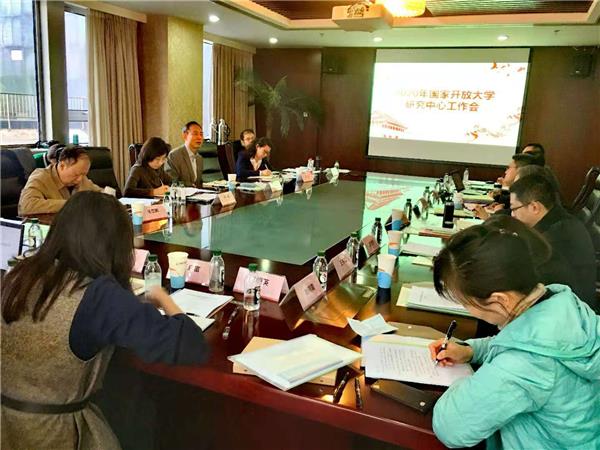 The Research Centre of the Open University of China (OUC) held its annual work conference for 2020 in Beijing in order to discuss and evaluate its work. OUC vice president Ju Chuanjin, the director and representatives of the Centre, and all members of the Lifelong Education Institute attended, with the meeting presided over by Li Wei, deputy director of the Institute.
The Research Centre of the Open University of China (OUC) held its annual work conference for 2020 in Beijing in order to discuss and evaluate its work. OUC vice president Ju Chuanjin, the director and representatives of the Centre, and all members of the Lifelong Education Institute attended, with the meeting presided over by Li Wei, deputy director of the Institute.

Ju Chuanjin pointed out that the meeting marked a good start for the development of the Centre. With evaluators having provided in-depth comments on its work, he expected the Centre would clarify its goals, prospects and research standards. He also offered four suggestions for its work. The first was that the Centre connect its research with national strategies and policies and integrate it with regional economic and educational development, while setting clear directions and identifying priorities. The second was that the Centre prioritise educational reform, targeting the whole OUC system, taking advantage of its strengths, supporting the development of young teachers, and bringing in more teachers to work there, so as to reinforce its strengths and make up for its weaknesses. The third was that, along with open education, the Centre should innovate in the fields of continuing and higher education, helping modernise education in China, and assisting the construction of a first-class Open University. Fourth, the Centre should strive to meet educational needs, create conditions for international cooperation and exchange, expand the influence of the OUC, and enhance its capacity for scientific research.
Wang Ying, director of the Institute, reviewed the organisational, team-construction, team-operations and research work of the Centre, pointing out that the conference was mainly focused on the implementation of the work requirements of the Centre established by the university in early 2020, so as to ensure that the Centre would produce high-quality scientific research.
Representatives of eight research centres, including the OUC Learning City Research Centre, the Research Centre for Learning Support Services in Open Education, the Education Information-management and Information-systems Research Centre, the Qinghai Provincial Education-research Centre, the Border Defense Education-research Centre, the Chinese Traditional Culture Research Centre, the Integration of Industry and Education Research Centre, and the Digital Campus Research Centre, reported on their work in 2020.
Zhang Zhupeng, researcher with the National Institute of Education Sciences; Guo Qingqing, OUC researcher; and Dr. Liu Bangxiang, an expert on enterprises, discussed and evaluated the 2020 work achievements of the Research Centre. In their view, the work of the eight centres suited their capabilities, and they had achieved good results while enhancing the skills of their faculty. Nonetheless, efforts to produce high-quality work needed to continue.
By Jiang Xiaoqing, OUC